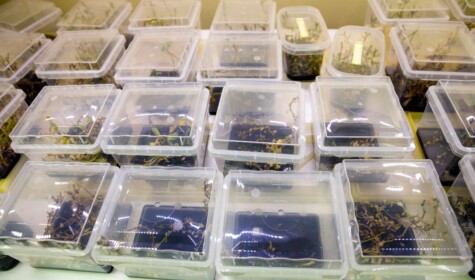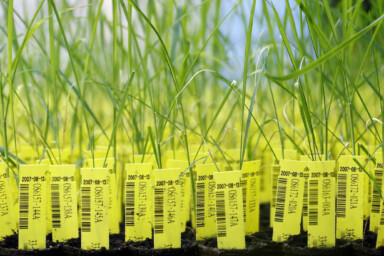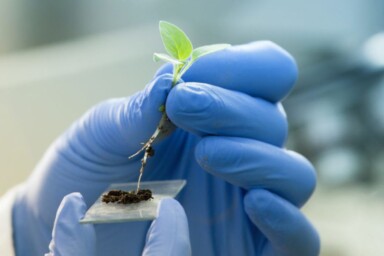The Sustainable Food Trust is strongly opposed to any relaxation of the regulations on genetically altered crops and animals, including those produced by gene editing. We feel the Government’s focus on high-tech agriculture is misplaced and will increase the industrialisation of food production at the expense of people and our ability to produce adequate supplies of nutritious food in the future.
Our CEO Patrick Holden shared his views in this recent blog in which he says, “If the UK Government is successful in removing the current regulatory barriers to gene editing, I believe there could be potentially catastrophic consequences for biodiversity, welfare, sustainability and public health.”
Click here to read the SFT’s response to the UK consultation.
What is gene editing?
Gene editing (GE) artificially alters the genetic makeup of a plant or animal using technology which enables scientists to cut DNA at a specific spot. DNA can then be added, removed or replaced where it was cut. This differs from other genetic modification which typically introduces ‘foreign’ genes from a different organism. One of the most popular gene editing tools CRISPR was unveiled in 2012, making gene editing much cheaper and easier than it had been previously.
What is the Government proposing?
The Government is proposing to amend the statutory definition of a Genetically Modified Organism (GMO) as it applies in England so that GM legislation would no longer apply to organisms produced by GE and other genetic technologies if they could have been developed using traditional breeding methods.
Amending the definition of a GMO in this way would affect the regulation of plants and animals produced for human consumption and would also affect which food and animal feed products are regulated under GM legislation.
This would mean that a wide range of plants and animals that have been modified through gene editing could be introduced without the need for labelling or specific regulatory approval.
Why are we concerned?
A situation could quite rapidly arise whereby a majority of crops and livestock products that we eat have been subjected to gene editing. Of equal concern, after the second generation, it will become impossible to determine whether a plant or animal has descended from a gene edited organism.
This is likely to further increase the decline in biodiversity, with heritage seeds and species shunned in favour of a few homogenised, high yielding varieties.
We face unprecedented challenges in our food system, including climate change, biodiversity decline, soil degradation and public health. We believe these crises can only be addressed through a fundamental shift in the way we farm, moving away from the damaging practices of industrial agriculture and towards regenerative practices, in harmony with nature.
The Government’s approach to gene editing displays a mindset which seeks to treat the symptoms rather than the cause of problems in our food system and environment. It assumes that problems such as those afflicting plant health or nutrient quality can simply be corrected through gene editing rather than by addressing the management deficiency which has caused the problem in the first place.
Using gene editing as a technological fix in this way fails to acknowledge positive health, not only in humans and animals, but also in the soil which is a precondition for healthy food production. This lack of systemic thinking instead perpetuates the extractive industry which much of modern farming has become.
Gene editing involves new and evolving technologies that are as yet untested. Deregulating such technologies could remove vital safety checks and result in a lack of transparency if gene edited foods are no longer labelled. Consumers should have a right to make informed choices about the foods they eat but cannot do so if the method of production or technologies used to produce the food are kept hidden. Similarly, organic and other non-GM farmers could lose the ability to guarantee their farming systems do not involve gene edited crops or feed.
It is widely felt that the Government has already formed a view on gene editing and is merely going through the process of a public consultation in order to seek public backing for policy change. This goes against Cabinet Office Consultation Principles which state that government should, “not ask questions about issues on which you have already formed a final view.”
Prime Minister Boris Johnson has already clearly stated that one of his priorities is to “liberate the UK’s extraordinary bioscience sector from anti-genetic modification rules.”
The Cabinet Office Principles also state: “Consultations should be informative. Give enough information to ensure that those consulted understand the issues and can give informed responses,” and should, “Include validated impact assessments of the costs and benefits of the options being considered when possible.” Yet the consultation fails to include an impact assessment and is not informative, lacking references or scientific evidence.
Beyond GM have lodged a formal complaint regarding the consultation here.
What can you do?
If you share our concerns about gene editing, respond to the Government’s consultation by Wednesday 17th March. Read Beyond GM’s guide to responding here, the Soil Association’s guide here and the Land Workers Alliance guide here. And don’t forget to share on social media to encourage others to respond.
Call on supermarkets to say no to GMO. Alongside more than 50 leaders from food, farming and other backgrounds, we signed a letter by Beyond GM to UK supermarkets asking them to refuse to stock foods produced from unregulated and unlabelled gene-edited crops and animals. The Co-op has been the first to make a clear statement not to stock such products. You can help encourage other supermarkets to do the same by sharing the letter on social media, tagging all the UK supermarkets.
Sign this petition to protect GMO food labelling.
Read and share our CEO Patrick Holden’s blog on gene editing here.





